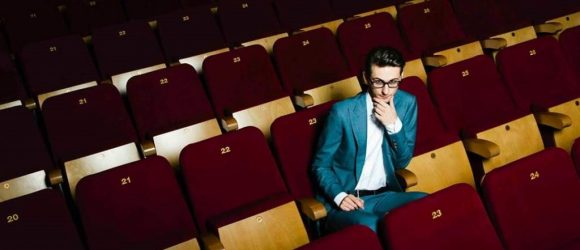Defense of the artistic research project “The Concept of a Piano School, Its Developement, and the Impact on Contemporary Performance Paradigms”
- 2020-12-14
- | News

On December 11–12, 2019, the defense of Jurgis Aleknavičius artistic doctorate project “The Concept of a Piano School, Its Developement, and the Impact on Contemporary Performance Paradigms” will take place at the Lithuanian Academy of Music and Theatre. Artistic Supervisors: Prof. Jurgis Karnavičius, Prof. Habil. Dr. Leonidas Melnikas. Research consultant: Assoc. Prof. Dr. Lina Navickaitė-Martinelli. Copies of the research paper and its summary are available at the library of the Lithuanian Academy of Music and Theatre (Gedimino pr. 42).
Free entrance.
Defense of the creative part of the artistic doctorate project
December 11, 2019, 7 p.m.
LMTA Building 1: Great Hall (Gedimino Ave. 42, Vilnius)
PROGRAM
Arvo Pärt – Fratres
Wolfgang Amadeus Mozart – String Quartet no. 17 K.458
Sergei Prokofiev – Violin Sonata no. 2 op. 94a
Defense of the artistic research paper
December 12, 2019, 2 p.m.
LMTA Building 1: Juozas Karosas Hall (Gedimino Ave. 42, Vilnius)
CHAIR OF THE DEFENSE BOARD OF ARTISTIC RESEARCH PROJECT – Prof. Rūta Rikterė
MEMBERS OF THE BOARD:
Prof. Birutė Vainiūnaitė
Dr. Julian Hellaby
Prof. Dr. (hp) Gražina Daunoravičienė
Prof. Dr. Audronė Žiūraitytė
REVIEWERS:
Prof. Sergej Okruško
Prof. Dr. Rūta Stanevičiūtė-Kelmickienė
Abstract
A piano school as a historically changing and developing phenomenon whose central figure is a performer, seeking to perceive and convey the creative ideas incorporated in the composer’s musical text through live performance.
In the research of piano schools and it’s impact on the contemporary paradigms the main focus is put on the three main paradigms: the conceptual, vocal, and colouristic. performance paradigms were identified, which accumulated performance practices formed and established by piano schools. The study of these paradigms prompts answers to important questions: On what basis can composition interpretation practices be identified and systematised? What role in the process is played by performer’s personal qualities, the environment, and fashion priorities? Does the pedagogical genealogy make it possible to see the most distinctive features of a piano school? How is the performer’s interpretation affected by the composer’s creative style, country-specific culture, and aesthetic values? The analysis of these aspects provides answers to the main question addressed in the present paper: how and why the above mentioned paradigms of the art of piano performance were formed.

